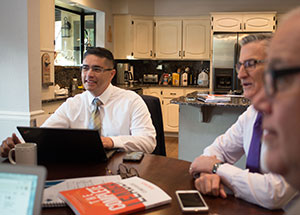Purpose, Passion & the Power of Everyday Leaders
A Conversation with Dr. Bobby Sanchez
Dr. Bobby Sanchez is our venerable Chief of Staff here at Price Associates. Prior to joining our team, Bobby served 24 years in the United States Army, retiring in 2012 at the rank of Lieutenant Colonel, after a career in both conventional and special operations assignments. We sat down with Bobby to talk about the leadership lessons he learned during his military career, and how they apply to his leadership today.
What significant leadership lessons have you learned through your career?
We all walk unique paths in life, guided by our passions and purpose. I believe you need to find a purpose in your work beyond just making money. As Confucius said, “Choose a job you love and you will never have to work a day in your life.” I have learned over the years that if you don’t have a strong sense of your purpose for your work or career, you can quickly lose your desire to make a positive difference, put at risk your effectiveness, and limit your sphere of influence.
I spent almost my entire adult life as an officer in the U.S. Army and am extremely thankful for the privilege and honor of serving our country, including the solemn responsibility of leading America’s sons and daughters in peacetime and combat. Serving in the military for me represented the near perfect alignment of individual values, purpose, and passion to organizational beliefs and ideals. After 24 years in uniform, I am confident my military service helped make me a better leader, a much better father, husband, and friend.
The lessons I learned include the importance of knowing yourself, which includes not only your strengths and weakness, but what really drives and motivates you as a person and as a leader. The best leaders I have served with have a clear understanding of who they are and what they value. They taught me that leadership isn’t about a title or position – rather it’s about choosing to live up to the highest standards of character while striving to become a better version of yourself each day. As leaders, each of us have a personal choice in displaying the character and integrity required to make hard choices, personal sacrifices, and to do the right thing (not just the popular thing).
Leadership also requires understanding the talents, skills, motivations, and passions of your team. I am fascinated by the science focused on helping people connect in very deep and meaningful ways. We have come a long way in assessing individual talents, identifying people’s natural and adaptive behaviors, and measuring the different types of motivators in a person’s life.
What were some of your favorite military leadership experiences?
One of the hallmarks of the military is the dedication and commitment of its service members—people who come from all backgrounds and walks of life. The privilege of leading those who wear the uniform is a solemn responsibility. After almost 25 years of serving in the U.S. Army, I can definitely say my favorite leadership experiences were the moments I spent with young soldiers and junior leaders. I always strived to learn something them, their thoughts on our profession, how they viewed the world, and especially their insights into how I could be a better leader.
I have fond memories of the very first leadership assignment I had as a young second lieutenant in the 25th Infantry Division responsible for leading 40 soldiers and non-commissioned officers. Looking back on those early days, I was tempted to prove myself as a leader by demonstrating my tactical competency, skill, and physical abilities. While these are important things to have as a leader in the military, I was quickly reminded by my senior ranking sergeant, “The guys really don’t care how much you know until they know how much you care.” This advice proved to be invaluable to me not only in my military career, but in my personal life as well.
Toward the latter part of my career, I had the tremendous opportunity of serving as the special assistant to a two-star general and two different four-star admirals. Each of these opportunities were among the most demanding assignments I ever had during my time in the military, yet were very rewarding. These unique assignments provided a “ring-side seat” to the most senior levels of leadership in the Department of Defense and the opportunity to observe (and learn) how senior leaders formed a vision, made decisions, communicated with other key leaders, sifted through the noise (or volumes of information) and led large, geographically dispersed organizations was tremendously rewarding. From these diverse experiences, I grew in my understating of the value of relationships, personal and professional networks, and the significance of effective communications. Perhaps most importantly, maintaining focus on things which matter the most.
While I learned leadership lessons from great leaders like General Stan McChrystal—who taught me that great leaders can allow you to fail, yet not be a failure—the most powerful leadership examples where taught to me by ordinary people. Men, women, and children who, in the midst of extraordinary circumstances in places like Kosovo, Iraq, and Afghanistan, demonstrated to me loyalty, personal courage, and a sense of selflessness far beyond what any other leader ever taught me. Each one serving as a reminder to me to me that leaders are found everywhere around us.


